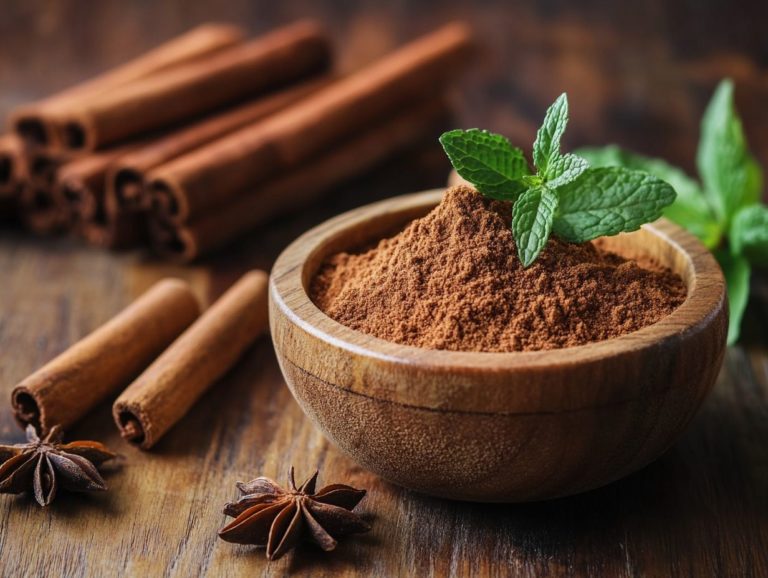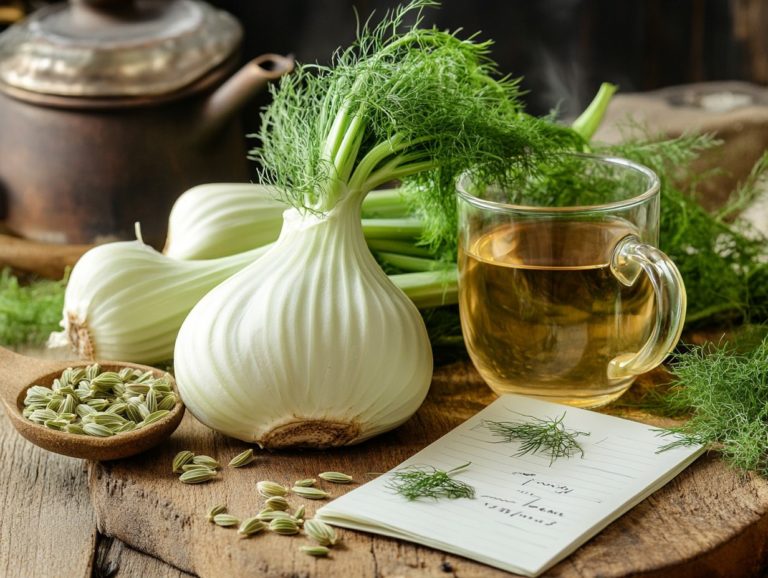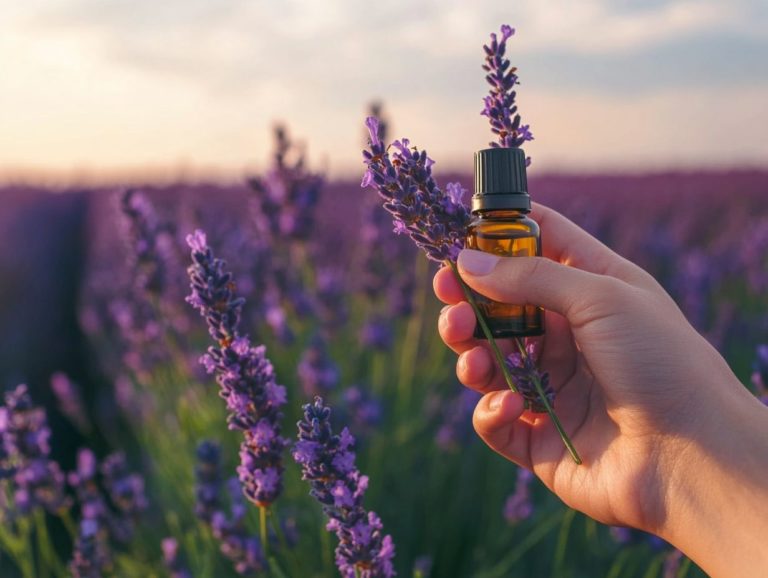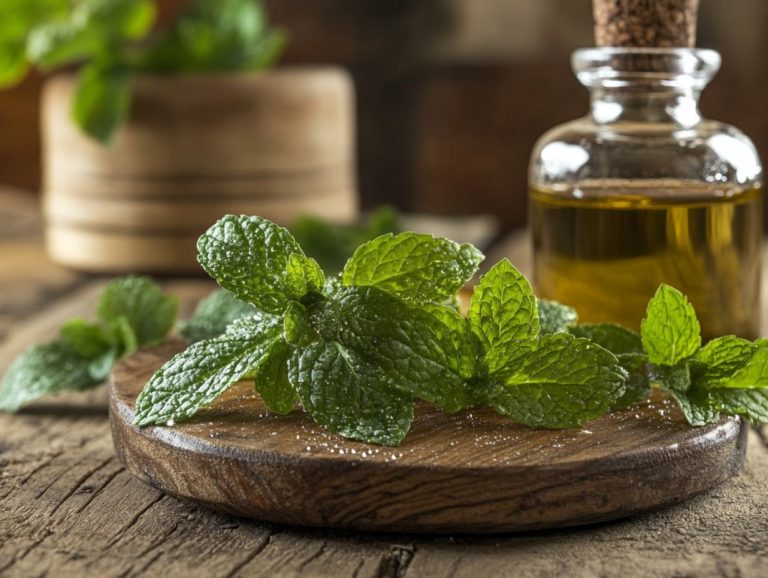5 Herbs to Improve Your Sleep Quality
Struggling with sleepless nights? You re in good company. Many individuals turn to natural remedies to elevate their sleep quality, and herbs have emerged as a favored option.
This article delves into five powerful herbs Lavender, Valerian Root, Chamomile, Passionflower, and Ashwagandha that can assist you in drifting off more easily. You ll also find tips for enhancing your sleep and guidance on when to consult a doctor.
Get ready for a journey toward restful nights that will leave you feeling invigorated!
Contents
Key Takeaways:
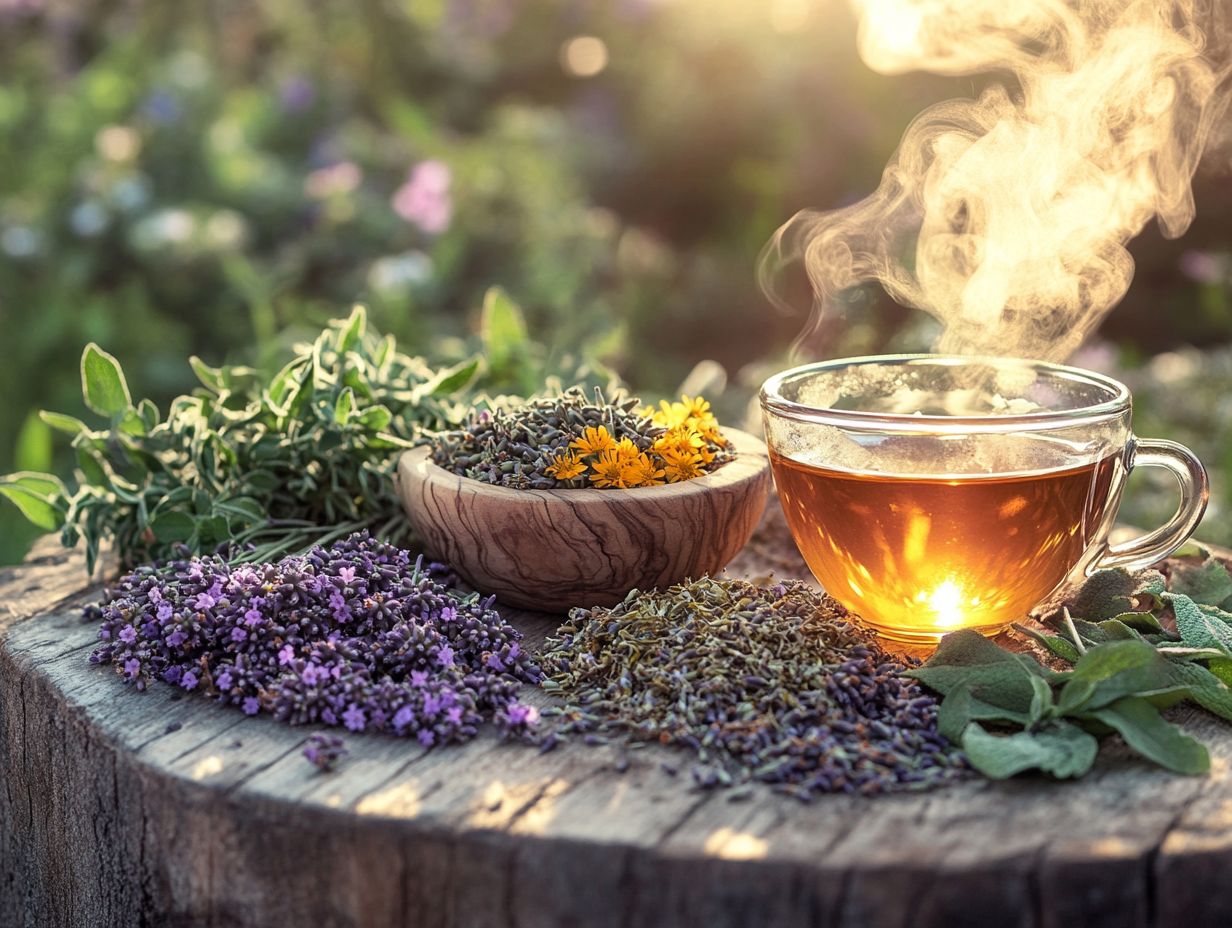
- Lavender, Valerian Root, Chamomile, Passionflower, and Ashwagandha are powerful herbs that can improve sleep quality.
- These herbs calm your mind and promote relaxation for better sleep.
- Consult a doctor before using these herbs and follow recommended dosages to avoid side effects.
1. Lavender
Lavender is celebrated for its calming effects and serves as a remarkable ally for respiratory health and a natural alternative for sleep support.
It promotes relaxation in both mind and body, particularly for those grappling with sleep disturbances. The soothing aroma of lavender enhances serotonin levels, fostering a sense of well-being and tranquility.
You might find that incorporating lavender essential oils into your bedtime routine transforms your environment into a sanctuary of calm. Whether diffused or used during a gentle massage, the scent creates an atmosphere that readies your body for rest.
Consider indulging in herbal teas infused with lavender as part of your pre-sleep ritual. A warm cup can help soothe your mind, inviting relaxation.
By integrating lavender into your sleep hygiene practices like placing sachets under your pillows or using lavender-infused linen sprays you can significantly enhance your sleep quality. It’s truly an essential addition for anyone seeking restorative slumber.
2. Valerian Root
Valerian root is a celebrated herbal supplement known for its remarkable sleep support properties. Many individuals seek it as a natural alternative to traditional medicine for insomnia and other sleep-related concerns.
This herbal remedy may boost the levels of GABA, a brain chemical that helps you relax and regulates sleep cycles. Many embrace valerian root for its ability to assist in falling asleep and enhance overall sleep quality. For more options, consider the top 5 DIY herbal remedies for stress relief.
However, it s crucial to approach its use mindfully, as some may encounter side effects like dizziness or gastrointestinal discomfort. The typical dosage is between 300 to 600 milligrams, taken 30 minutes to two hours before bedtime.
Consulting a healthcare professional for personalized guidance is essential to ensure you re on the right track.
3. Chamomile
Chamomile, often enjoyed as an herbal tea, is renowned for its calming qualities and ability to foster relaxation. It s a superb option if you re looking to enhance your sleep quality and alleviate anxiety.
Sipping chamomile tea before bedtime sends a gentle signal to your body that it s time to unwind, creating a soothing ritual that elevates your sleep experience.
Its mild sedative effects quiet racing thoughts, allowing your mind to drift into a state of tranquility. Many find that pairing chamomile with complementary herbs like lavender or passionflower amplifies its relaxation benefits, nurturing a peaceful night s rest.
This harmonious blend not only enhances relaxation but also enriches your evening routine, providing a thoughtful way to embrace calmness and prepare for restorative sleep.
4. Passionflower
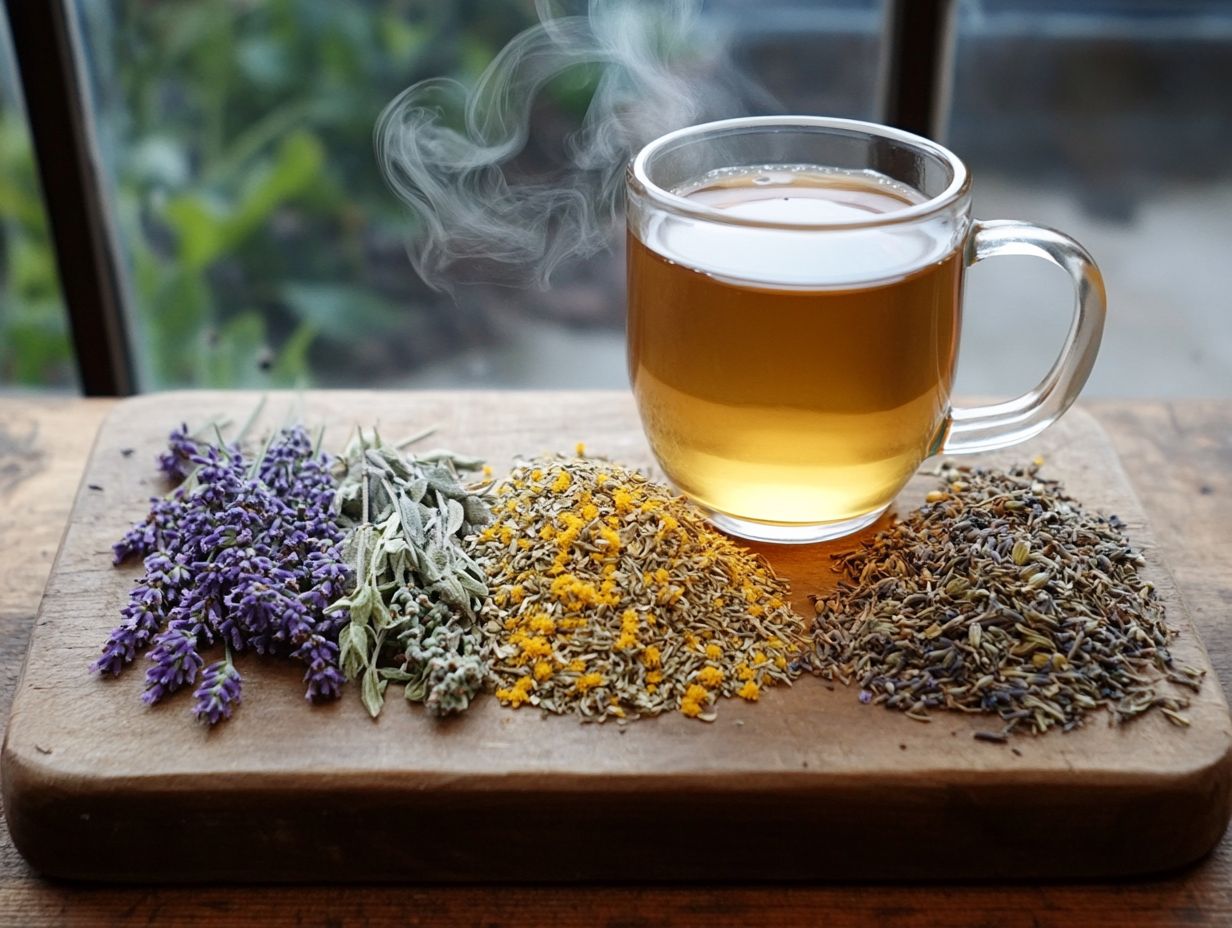
Passionflower stands out as a remarkable herb, renowned for its ability to alleviate anxiety and promote restful sleep. This helps to boost serotonin levels, making it an invaluable addition to your natural sleep support regimen.
Within passionflower lie powerful compounds, including flavonoids and alkaloids. These compounds engage with neurotransmitters in your brain, binding to GABA receptors, a part of your brain that helps you feel calm. This process eases feelings of stress and ushers in a serene state, facilitating your transition into rejuvenating sleep.
Consider starting with a low dosage of this herbal remedy. Monitor how your body responds, as everyone has different tolerances. While generally considered safe, some individuals may experience side effects such as drowsiness or stomach issues.
To maximize its benefits, ensure you source high-quality passionflower. Consulting with a healthcare provider before starting is highly recommended.
5. Ashwagandha
Ashwagandha is a remarkable adaptogenic herb that supports restful sleep and relieves anxiety. It s a popular choice for those seeking natural alternatives to conventional medicine.
This herb works by modulating your body’s stress response and regulating cortisol levels. These factors often disrupt your ability to enjoy a peaceful night s sleep and can intensify feelings of unease.
By fostering a sense of calm and balance, ashwagandha enhances the overall quality of your sleep, leading to deeper, more restorative rest. You can also combine it synergistically with other calming herbs like valerian root and chamomile. Additionally, incorporating herbs that support healthy digestion amplifies their soothing effects and creates a holistic approach to improving your sleep and managing anxiety effectively.
How Do These Herbs Help with Sleep?
These herbs lavender, valerian root, chamomile, passionflower, and ashwagandha are your go-to allies for enhancing sleep quality and providing essential support for a restful night. They act as natural promoters of peaceful slumber.
Lavender s soothing aroma isn t just pleasant; it decreases anxiety and enhances sleep cycles. This effect is due to its high concentration of linalool, which encourages relaxation.
Valerian root, often lauded for its sedative properties, contains compounds that may boost gamma-aminobutyric acid (GABA) levels in the brain. This helps you feel calm and tranquil.
Chamomile is packed with antioxidants like apigenin, which binds to brain receptors and ushers in drowsiness. Passionflower, renowned for its anxiety-reducing effects, has studies backing its capability to significantly improve sleep quality. Additionally, exploring 5 must-try herbal preparations for better sleep can enhance your nighttime routine. Ashwagandha, the adaptogen of choice, has proven its worth by lowering cortisol levels, effectively combating stress and paving the way for a serene night’s rest.
People have transformed their sleep by adding these herbs to their evening rituals. Why not give it a try?
Are There Any Potential Side Effects of Using These Herbs?
While these herbs are generally regarded as safe, it s crucial to understand the potential side effects associated with their use, especially when seeking natural alternatives to conventional medicine.
Even the most benign herbal remedies can lead to unexpected reactions. This is particularly true for individuals with pre-existing health conditions or when mixed with conventional treatments. For example, certain herbs might cause gastrointestinal disturbances, trigger allergic reactions, or interact negatively with medications such as blood thinners and antidepressants.
Therefore, it’s essential to consult with a healthcare provider before incorporating these supplements into your routine. This step not only ensures the safe use of these natural options but also helps you make informed choices that align with your unique health profile and medical history. Take charge of your health! Talk to your healthcare provider before starting any new herbal supplement.
What Is the Recommended Dosage for These Herbs?
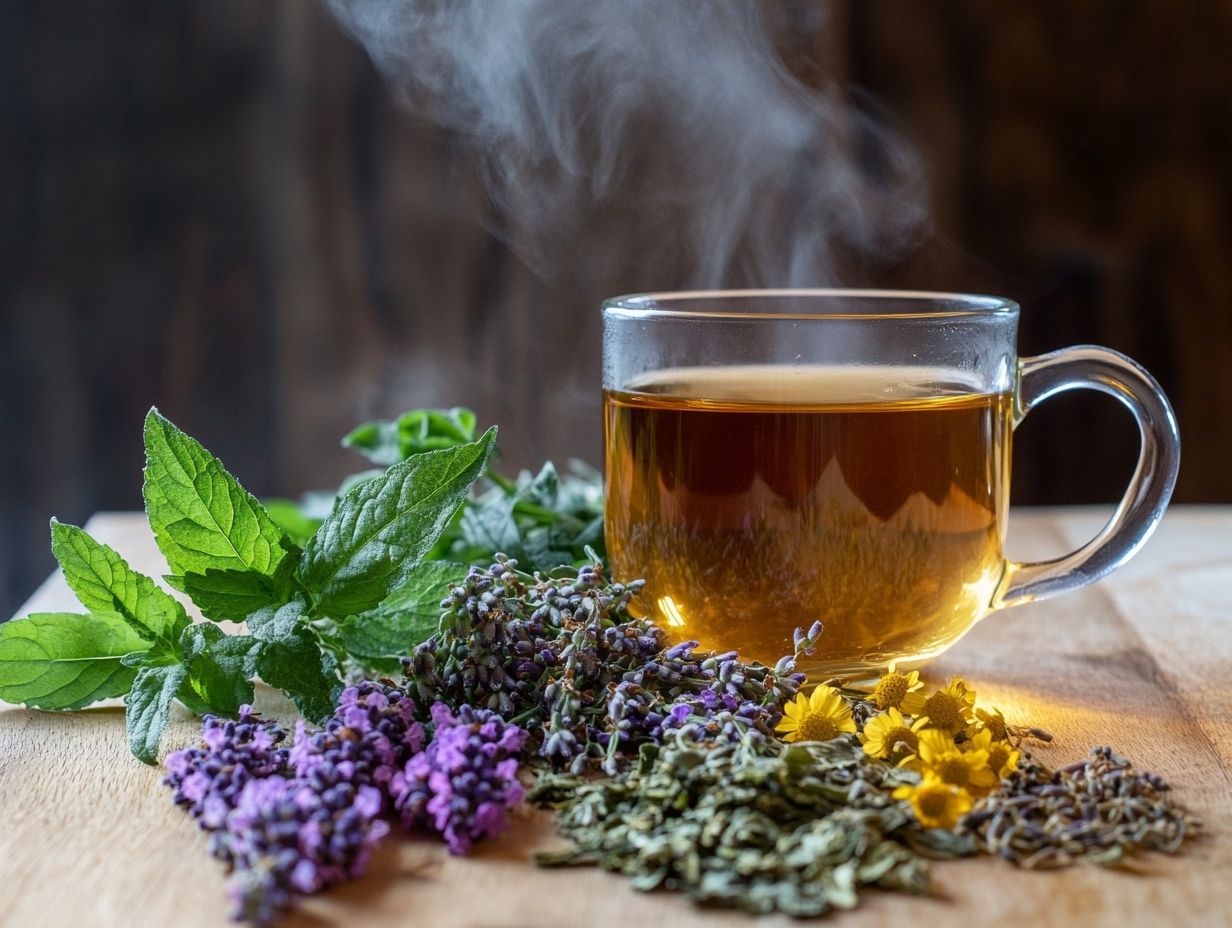
Understanding the recommended dosage for these herbs is essential to maximize their sleep-support benefits.
This approach minimizes risks related to overdosing or misuse of dietary supplements.
Consider that individual health conditions, body weight, and overall lifestyle significantly influence how you may react to these natural remedies. For example, if you’re dealing with anxiety, your dosage might differ from someone who is simply looking to enhance their sleep quality.
Herbal preparations come in various forms like capsules, teas, or tinctures each with its own dosage. Always check the product labels for safe use.
Consulting a healthcare provider can help tailor these recommendations to your specific health needs, allowing you to make the most informed decisions.
Can These Herbs Be Used in Combination with Each Other?
Combining these herbs can enhance their sleep-promoting effects, allowing you to experience deeper benefits when effectively addressing sleep-related issues.
By thoughtfully selecting the right combinations, you can harness the unique properties of each herb. For example, blending chamomile, known for its calming effects, with valerian root, which may help you relax, can enhance your sleep experience.
Adding passionflower to this mix amplifies those calming effects, transforming it into a powerful sleep aid.
When crafting effective herbal blends, start with small amounts. Observe how different combinations interact, and adjust the dosages accordingly to create personalized remedies tailored to your specific sleep needs.
What Are Some Other Natural Ways to Improve Sleep Quality?
Along with herbal supplementation, numerous natural strategies can elevate your sleep quality. Practicing good sleep hygiene, engaging in relaxation techniques, and making thoughtful dietary adjustments can all play pivotal roles.
Refining your bedtime routine by establishing a consistent schedule and crafting a calming environment signals your body that it s time to unwind.
Incorporating relaxation techniques like deep breathing or gentle yoga can deepen your sense of tranquility. Even the simple act of walking barefoot on grass or sand fosters a sense of connection and reduces stress.
Enhancing your sleep environment with essential oils, such as lavender or chamomile, turns your bedroom into a serene sanctuary, paving the way for deeper, more restorative sleep.
When Should One Consult a Doctor About Their Sleep Issues?
Consulting a doctor about sleep issues becomes essential when disturbances persist, as these may signal underlying health conditions that require professional evaluation and appropriate insomnia treatments.
Severe insomnia lasting weeks can lead to chronic fatigue, impacting your daily functioning and overall quality of life. Symptoms are often intensified by over-the-counter remedies or natural alternatives that miss the mark.
It’s vital to recognize signs that may indicate a more serious issue, such as mood swings, memory problems, or an unshakeable sense of tiredness. Seeking help can provide clarity and support, guiding you toward targeted therapies to restore your healthy sleep patterns.
Frequently Asked Questions
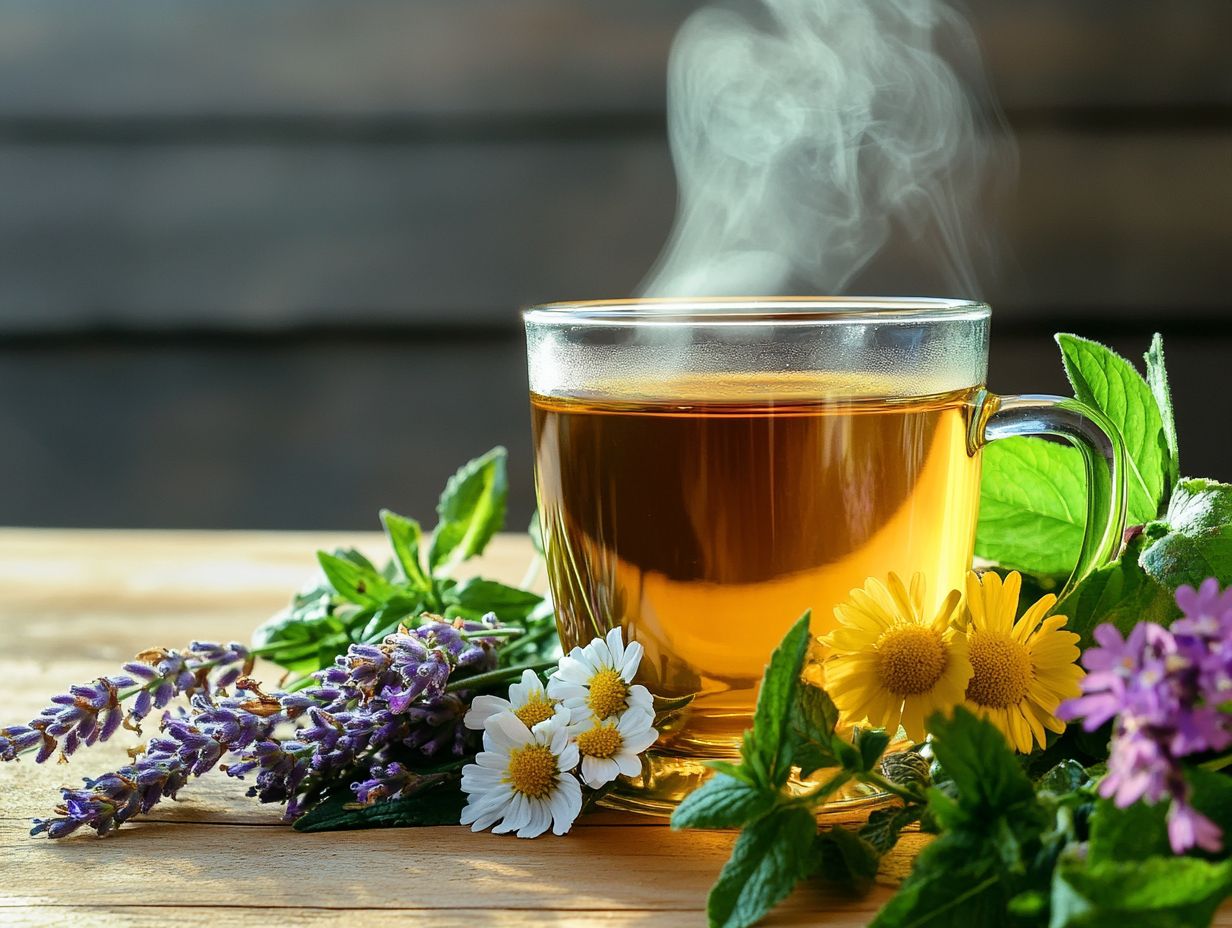
What are the top 5 herbs to improve sleep quality?
The top 5 herbs to improve sleep quality are valerian root, chamomile, lavender, passionflower, and lemon balm.
Ready to try these herbs for better sleep? Start your journey to restful nights today!
How does valerian root help with sleep?
Valerian root has been a go-to for helping people sleep for centuries! It has natural compounds that relax your body and calm your mind, helping you to drift off faster and sleep better.
Why is chamomile beneficial for improving sleep?
Chamomile is famous for its calming effects. It reduces stress and anxiety, making it easier to enjoy a restful night.
This herb contains a special substance called apigenin that encourages your brain to feel sleepy.
Can lavender help with insomnia?
Absolutely! Lavender is great for insomnia. It eases stress and anxiety, helping you relax for a better night’s sleep.
Its calming aroma can soothe both your mind and body.
What is the best way to consume passionflower for better sleep?
You can enjoy passionflower by sipping tea or taking supplements for better sleep. It s also available as a tincture or extract if you prefer.
How does lemon balm aid in improving sleep quality?
Lemon balm has long been used to calm stress and promote relaxation, making it a fantastic choice for better sleep.
Its compounds can help you fall asleep quickly and stay asleep longer.

